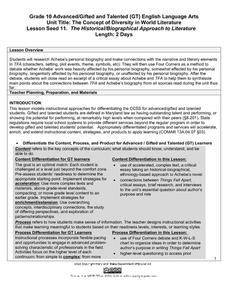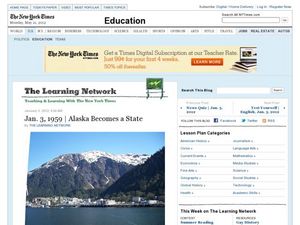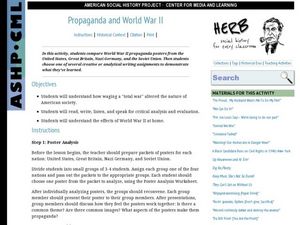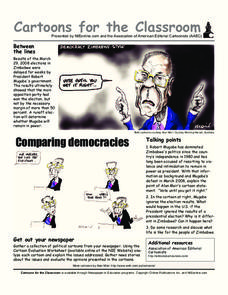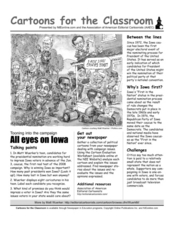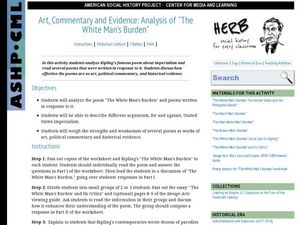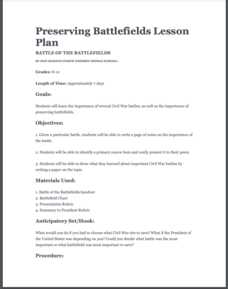Maryland Department of Education
The Concept of Diversity in World Literature Lesson 11: The Historical/Biographical Approach to Literature
How affected is Thinks Fall Apart by Chinua Achebe's personal biography? Using a four corners strategy, and evidence from their readings, class members debate the degree of biographical influence in Achebe's novel.
Curated OER
Understanding and Using Primary and Secondary Sources in History
Explore primary and secondary sources in this historical analysis lesson. Young researchers define the terms primary source and secondary source. They read a primary source document provided by the teacher and answer questions about the...
Curated OER
Nov. 17, 1973 | Nixon Declares 'I Am Not a Crook'
Connect events of the past to events of today. Budding historians read an eight paragraph passage describing the Watergate scandal. They then connect the Nixon scandal to sex scandals of recent times. There are six critical thinking...
Curated OER
Jan. 3, 1959 | Alaska Becomes a State
Make connections with past history and current events with this critical thinking exercise. Kids read background information relating to Alaska's statehood as well as information on oil drilling and Alaska's economy. They put it all...
Curated OER
Propaganda and World War II
What was the true meaning behind WWII propaganda posters? Historians analyze images from the U.S., Great Britain, Nazi Germany, and the Soviet Union, sharing findings in small groups. A poster analysis worksheet and all posters are...
Curated OER
A Day of Infamy:Analyzing FDR’s Pearl Harbor Address
In 1941 FDR spoke out on the events at Pearl Harbor. The class will get to analyze word choice, word meaning, author's craft and structure by analyzing an actual draft of this speech. They will look critically at the words used,...
Curated OER
Lesson: From the Horse's Mouth
Kids turn a critical eye on a wooden horse that was carved in ancient China. They analyze the horse as far as its purpose, historical significance, and artistic style, then write a story from the horse's perspective.
Curated OER
Slave Resistance
These historical scenarios are designed to aid the class understand how slaves resisted their masters. They are presented with six scenarios which they then respond to by describing how they would resisted slavery in each situation. This...
Curated OER
Cartoons for the Classroom: The Tea Party
Investigate the Tea Party Movement through this political cartoon analysis handout! Background information gives scholars the necessary context to access the cartoon, and includes the historical derivation of the Tea Party name. Three...
Curated OER
Cartoons for the Classroom: Comparing Democracies
Could a president just ignore election results? For this analysis handout, scholars consider this question as they read background information on the 2008 elections in Zimbabwe. Two political cartoons poke fun at President Robert Mugabe,...
American Institute of Physics
Historical Detective: Edward Alexander Bouchet and the Washington-Du Bois Debate over African-American Education
Young scientists meet Edward Alexander Bouchet who, in 1876, was the first African American to receive a PhD in Physics. This two-part lesson first looks at the debate between Booker T. Washington and W.E.B. Du Bois about the type of...
Curated OER
Scaffolded Reading of "Drawing of an African Burial Ground Grave in Situ"
The class reads the description of the "Drawing of an African Burial Ground Grave In Situ" then completes a work sheet. They act like archaeologists and answer a series of critical thinking questions to better understand the historical...
Curated OER
Cartoons for the Classroom: All Eyes on the Iowa Caucus
Explore the primary elections through political cartoons. Three talking points guide deeper thinking as pupils analyze a cartoon, which depicts the 2008 campaigning in Iowa. Analysts identify caricatures, research why winning Iowa is...
Curated OER
Art, Commentary and Evidence: Analysis of "The White Man's Burden"
A cross-curricular lesson combines poetry and history for your middle and high schoolers. The class critically examines Kipling's poem, "White Man's Burden" as historical evidence of the Imperialist ideology popular during his time. The...
Curated OER
Who Freed the Slaves During the Civil War?
Pose the question to your historians: who really freed the slaves? They critically assess various arguments, using primary sources as evidence. In small groups, scholars jigsaw 5 primary source documents (linked), and fill out an...
West Virginia Department of Education
The Debate - John Brown: Martyr or Madman?
Did he die for a cause, or was he crazy? Although the resource discusses John Brown and West Virginia history, many historical figures have the same reputation. Teach learners about different perspectives and highlight the importance of...
Jane Addams Project
Woman Suffrage
Suffragettes, suffragists, and anti-suffragists. A two-day, richly detailed lesson plan has young historians investigate the twentieth-century suffrage movement. Groups examine primary and secondary source materials about Jane Addams and...
US Institute of Peace
Identifying Elements of Conflict
What lies at the heart of a conflict? Help pupils peel back the layers during an in-depth study of the elements of conflict. A lesson addressing peacekeeping and conflict management examines the historical, emotional, and societal...
American Battlefield Trust
Preserving Battlefields
Save that site! Budding historians go on a rescue mission to save important Civil War battle sites using a project-based lesson. After carefully researching the importance of critical engagements and evaluating current threats, learners...
Encyclopedia Britannica
Presidential Electability
There are specific constitutional requirements that candidates must meet to become president of the United States. In addition, there are societal opinions that affect a candidate's electability. Class members examine historical...
Anti-Defamation League
Analyzing Primary Source Documents to Understand U.S. Expansionism and 19th Century U.S.-Indian Relations
Historical events can be viewed from multiple perspectives. This simple truth is brought home in a lesson that examines primary source documents related to the Lewis and Clark Expedition, the Doctrine of Discovery and Manifest Destiny,...
Anti-Defamation League
Viewing History from Multiple Perspectives
Celebration or protest song? The full text of Woody Guthrie's "This Land is Your Land" opens a study of the Lewis and Clark Expedition, the Louisiana Purchase, and Western Expansion from various perspectives. Middle schoolers examine...
Curated OER
North Carolina Historical Sites
Eighth graders design and create a tourist brochure for North Carolina historical sites. They research North Carolina, find and scan pictures for their brochure, use ClarisWorks to form the text, print, display and use constructive...
Curated OER
Lesson: The Gift of Giving
Giving gifts has been a part of the human experience since modern man walked the earth. Upper graders explore the culture of gift giving in Mayan times through an artistic analysis. They analyze gift giving and palace life as seen on an...


